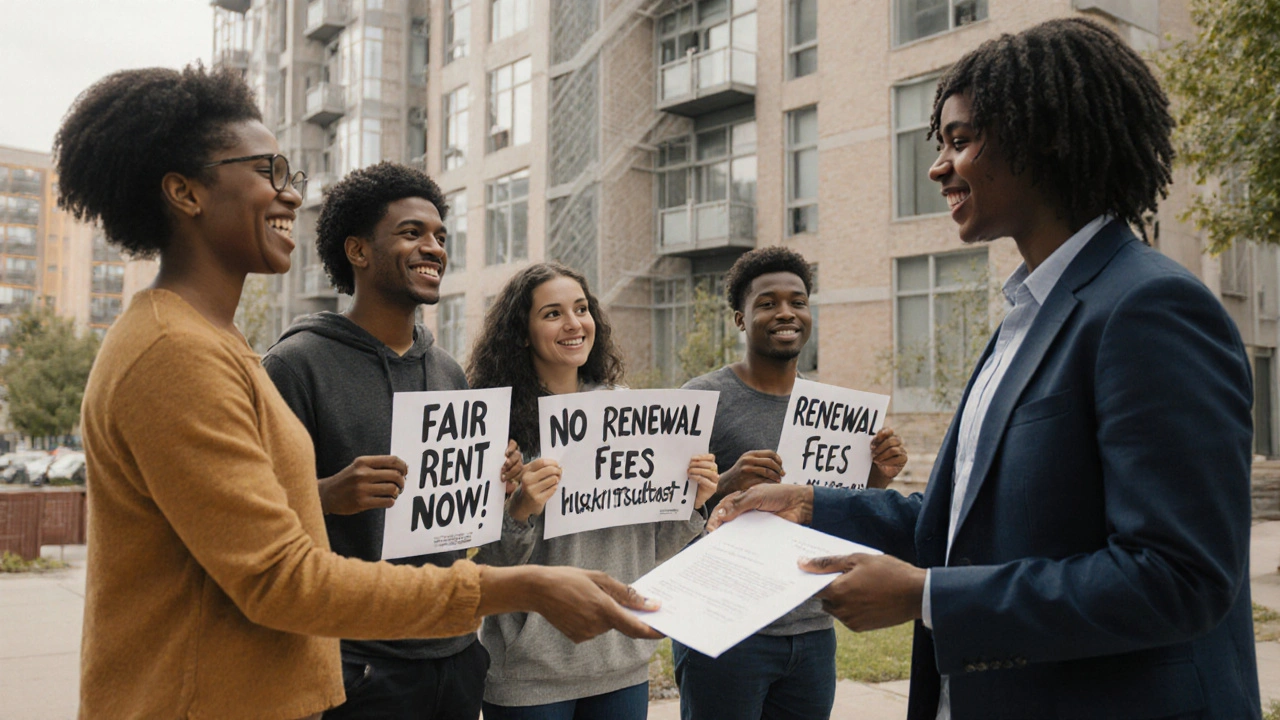
If you're a student in the UK, you've probably gotten that email or letter: rent increase. It’s not a surprise anymore - it’s almost expected. But that doesn’t mean you have to accept it without question. Rent hikes in student housing aren’t always legal, and renewal terms aren’t always fair. Knowing your rights and how to respond can save you hundreds, or even thousands, of pounds a year.
Why Do Student Rent Increases Happen?
Rent increases in student housing aren’t random. They’re usually tied to inflation, market demand, or property upgrades. In 2024, the UK’s Consumer Prices Index (CPI) rose by 2.8%, and many private student accommodation providers used that as justification for hikes of 3-5%. But here’s the catch: not all landlords follow the same rules.
University-managed halls often tie rent to CPI or RPI (Retail Prices Index), and they’re required to give you at least 30 days’ notice before a new rate takes effect. Private providers? They can be less transparent. Some use ‘market review’ clauses buried in fine print. Others raise rent simply because they know you’re stuck - you’ve already paid your deposit, moved in, and now you’re locked in.
According to a 2024 report by the National Union of Students (NUS), 62% of students in private accommodation received rent increases over 5% without clear justification. That’s not normal. It’s exploitative.
Check Your Contract Before You Panic
Your tenancy agreement is your first line of defense. Open it. Right now. Look for these three things:
- Rent review clause: Does it say rent can increase annually? If so, how? By a fixed percentage? By inflation? By ‘market rate’?
- Notice period: How much notice must they give? UK law requires at least 30 days for periodic tenancies, but some contracts demand 60 or 90. If they gave you 10 days, that’s invalid.
- Renewal terms: Does your contract auto-renew? If yes, are you being charged extra for that? Many providers charge a ‘renewal fee’ - which is illegal under the Tenant Fees Act 2019.
If your contract says rent can increase only with CPI and they’ve raised it by 8% while CPI was 2.8%, you have grounds to challenge it. Save screenshots of inflation data from the Office for National Statistics (ONS). Use them as evidence.
Renewal Isn’t Automatic - You Have a Choice
Many students assume they have to renew. They don’t. Renewing is a new contract. You’re not obligated to sign it. If you’re unhappy with the rent increase, you can:
- Renegotiate the rent
- Ask for a longer lease in exchange for a lower increase
- Move out and find cheaper housing
- Stay and pay the new rate - but only if you’ve accepted it in writing
Some providers will lower the increase if you commit to a 12-month renewal. Others will offer a free week or a discount on utilities. Don’t be afraid to ask. You’re not being difficult - you’re being smart.
One student in Manchester negotiated a 2% increase instead of 6% by pointing out that nearby properties were offering 3% hikes. She showed screenshots from Rightmove and Student.com. The landlord backed down.

What to Do If the Increase Is Illegal
Here’s the hard truth: some rent increases are flat-out illegal. That includes:
- Raising rent during a fixed-term tenancy (unless the contract allows it)
- Charging a renewal fee (banned under the Tenant Fees Act 2019)
- Increasing rent without proper notice (less than 30 days)
- Using ‘market rate’ as an excuse without comparing to similar properties
If you believe your increase is illegal:
- Send a formal email or letter asking for justification in writing
- Reference your contract and the law
- CC your university’s student union or housing office
- Keep copies of everything
If they ignore you or refuse to budge, you can report them to your local council’s private rented housing team. In England, that’s under the Housing Act 2004. In Scotland, contact your local Rent Officer. In Wales, use the Rent Smart Wales portal.
Students in London and Birmingham have successfully challenged illegal rent hikes through their student unions. One group in Cardiff got a 15% rent reduction after a collective complaint to the local authority.
Alternatives If You Can’t Afford the Increase
If the rent hike is legal but still unaffordable, you have options:
- Move to university-managed halls: They’re often cheaper and have regulated increases. Many still have spaces even after term starts.
- Find a house share: Renting with 3-4 others can cut your costs by 40-60%. Check Facebook groups like ‘Student Housing UK’ or local university boards.
- Apply for hardship funding: Most universities offer emergency grants for housing. You don’t need to be in crisis to qualify - just show your budget is unbalanced.
- Work part-time: Many student jobs pay £12-£15/hour. Working 10 hours a week adds up to £500/month - enough to cover most rent hikes.
One student in Leeds moved from a £750/month private flat to a £480/month shared house with a 10-minute bus ride to campus. She saved £3,240 a year.
How to Negotiate Like a Pro
Negotiation isn’t about being loud - it’s about being prepared. Here’s how to do it right:
- Compare similar properties: Find 3-4 listings for comparable rooms in the same area. Use Student.com, Rightmove, and Spareroom.
- Calculate your budget: Show them your income, expenses, and how the increase breaks your finances.
- Offer something in return: Commit to a 12-month lease, refer a friend, or agree to a longer stay in exchange for a lower increase.
- Be polite but firm: Say, “I’m happy to renew if we can agree on a fair increase. Based on current market rates, I’m seeing similar rooms at £X. Can we match that?”
Most landlords would rather keep a reliable tenant than spend weeks finding a new one. Use that leverage.

What to Avoid
Don’t do these things:
- Don’t sign anything without reading it - even if they say “it’s just a formality.”
- Don’t pay the increased rent until you’ve confirmed it’s legal. Withholding payment is risky, but paying under protest gives you legal standing.
- Don’t ignore letters. Even if you think they’re wrong, respond. Silence is taken as agreement.
- Don’t believe them if they say “everyone’s getting it.” That’s not a legal argument.
Also, avoid using rent increase as an excuse to skip paying altogether. That leads to eviction. You want to resolve this legally, not get a County Court Judgment (CCJ) on your record.
Where to Get Free Help
You don’t have to fight this alone.
- Your student union: Most have housing advisors who will help you write letters and negotiate.
- Shelter: The UK’s leading housing charity offers free advice. Call 0808 800 4444 or visit their website.
- Citizens Advice: They can help you understand your rights and draft formal complaints.
- University accommodation office: Even if you live off-campus, they often have lists of vetted landlords and fair rent benchmarks.
One student in Glasgow used her student union’s template letter to get a £120/month reduction. It took two weeks. She didn’t even have to go to court.
Final Thought: You’re Not Just a Tenant - You’re a Consumer
Student housing is a business. And like any business, it responds to pressure. The more students speak up, the less landlords can get away with. Your voice matters. A group of 10 students asking the same question is louder than one. A well-documented complaint carries more weight than an emotional outburst.
Don’t accept the first number. Don’t assume it’s normal. Don’t think you have no power. You do. And you’re not alone.
Can my landlord increase my rent during a fixed-term tenancy?
No, not unless your contract specifically allows it. Most fixed-term tenancies (like 12-month leases) lock in the rent for the full period. Any increase during that time without your written agreement is illegal. Check your contract for a rent review clause - if it’s not there, the landlord cannot raise rent until the term ends.
Do I have to renew my student housing contract?
No. Renewal is a new contract. You are under no obligation to sign it. If you don’t want to renew, give notice according to your tenancy agreement - usually 30-60 days before the end of your term. You can move out without penalty, as long as you follow the notice rules.
Is it legal for my accommodation provider to charge a renewal fee?
No. Under the Tenant Fees Act 2019, landlords and letting agents in England and Wales cannot charge tenants fees for renewing a tenancy. This includes administration, processing, or renewal fees. If you’ve been charged, you can demand a refund. In Scotland and Northern Ireland, similar protections exist under local housing laws.
How much notice must I get before a rent increase?
You must receive at least 30 days’ written notice before a rent increase takes effect - this is the legal minimum in the UK. Some contracts require 60 or 90 days. If you get less than 30 days, the increase is invalid. Always check your tenancy agreement for the required notice period.
What if I can’t afford the rent increase but still want to stay?
Talk to your accommodation provider. Ask if they can offer a payment plan, a smaller increase, or a discount for a longer lease. You can also apply for university hardship funds, look for part-time work, or consider moving to a cheaper property. Many students negotiate successfully by showing market comparisons and explaining their financial situation.